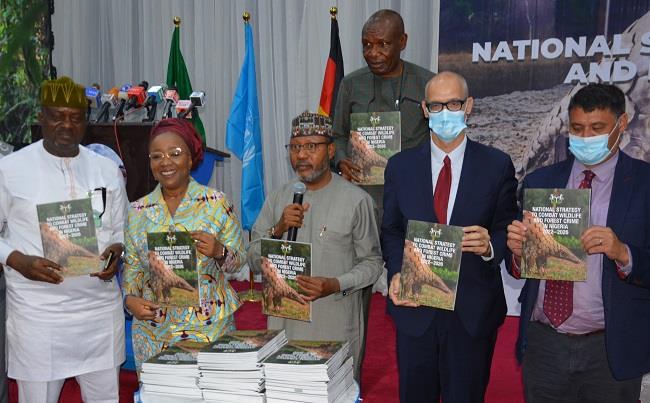The Federal Government of Nigeria, United Nations Office on Drugs and Crime (UNODC) and other relevant stakeholders have collaborated to create effective awareness in the fight against illegal wildlife and forest trade in Nigeria.

Alhaji Mohammed Abdullahi, Minister of Environment, made the commitment in Abuja, while inaugurating the 2022 to 2026 National Strategy to Combat Wildlife and Forest Crime in Nigeria on Monday, April 11, 2022.
Abdullahi said that the inauguration of the strategy is critical, with Nigeria seeking legislation and punishment for wildlife traffickers and other related forest trade in the country.
He said that the fight required enhancing institutional capacity, strengthening legal frameworks, increase collaboration enablers, raising awareness on wildlife and designing alternative means of livelihood for dwellers of local communities.
According to him, it is important to know that Nigeria, through the ministry, is committed in many ways in the fight against the menace.
“Nigeria is committed to the Convention on International Trade in Endangered Species of fauna and flora (CITES).
“The ministry will not relent as it continues to collaborate with partners and stakeholders at the international, national and regional levels in the thematic areas of the fight against illegal wildlife and forest trade.
“The fight is through the mechanisms of investigation, enforcement, prosecution, and stockpile management,’’ he said.
The minister said that attention would be focused on the implementation framework as enunciated in the strategy strength, Weaknesses, Opportunities and Threats (SWOT) analysis.
He said that the strategy would also highlight political, economic, socio-cultural, technological, legal, environmental, and law enforcement indices, with a view to ensuring that key players at the federal, state and other levels do the needful and are guided and motivated appropriately to maximise the gains of the strategy.
Abdullahi said that the ministry has provided all technical and necessary support towards the strategy implementation as well as adopted council states to ensure effective implementation of the strategy.
He said that the ministry has intensified strong awareness and advocacy campaign, adding that the campaign has expanded to the Federal Airport Authority of Nigeria (FAAN), the railways and airline operators.
He added that the ministry had also built electronic billboards which would be erected at locations such as airports and other strategic areas.
“The billboards will have clear and instructive messages to create awareness and sensitisation in the protection and conservation of wildlife and forest resources while discouraging illegal trade and trafficking in wildlife.
He said that a request has been sent to the Inspector General of Police (IGP) on the need to set up Wildlife Crime Unit within the force.
He said that the unit would be specially dedicated to deal with wildlife and forest-related crimes.
“We are stepping up action and our collaboration with our numerous partners will strongly support our quest in the fight against the illegal wildlife and forest trade,’’ he said.
Chief Sharon Ikeazor, the Minister of State for Environment, said that the strategy is aimed at tackling wildlife and forest crimes as well as achieving sustainable forest management that would address climate change.
According to her, “it is not enough to have the strategy as an addition to our collection. The fact remains that its effective implementation at all levels for the attainment of its core outputs and results will go a long way in achieving its objectives.
“We are going to make this a priority.
“The Federal Executive Council did not only approve the strategy for implementation at its recent meeting.
It also said “The effective implementation is possible only if and when the state governments adopt the strategy as part of their critical policy framework, so it is important for the state government to adopt the strategy,” Ikeazor said.
Mr Oliver Stolpe, Country Representative of UNODC, said that the office would continue to provide technical support to the development and effective implementation of the strategy.
“We are committed to partner with Nigerian agencies in the implementation of the strategy.
“I have no doubt in my mind that this well calibrated framework will enable all stakeholders involved to effectively put their efforts toward achieving the aim of the strategy,’’ Stolpe said.
Sean Melbourne, Head of Climate Change and Energy, West Africa, British High Commission, said that the UK Government is at the forefront of international efforts to tackle wildlife and forest crime and protect endangered animals from poaching and illegal trade.
His words: “Between 2014 and 2022, we will invest more than £46 million on work to directly counter the illegal trade in animals and plants, including by reducing demand and strengthening enforcement, by ensuring that effective legal frameworks are developed and sustainable livelihoods supported.
“The UK’s Illegal Wildlife Trade Challenge Fund has committed over £37 million to 113 projects around the world since it was launched at the London IWT Conference in 2014. Between 2018 and 2022, the UK also contributed £250 million to the Global Environment Facility – which included finance for the world’s biggest fund for tackling IWT, the Global Wildlife Programme (GWP). This supports IWT projects across 32 countries in Africa, Asia, and Latin America.”
He disclosed that the UK Government’s approach to the illegal wildlife trade in Nigeria specifically focuses on four key areas:
- First, by eradicating the market for the illegal wildlife trade;
- Secondly, by ensuring that effective legal frameworks and deterrents are developed;
- Third, strengthening law enforcement;
- Finally, supporting sustainable livelihoods and development in Nigeria.
Melbourne stressed that, in line with these pillars, the UK has been working through NGOs such as the Environmental Investigation Agency, Wildlife Conservation Society and others on activities in various parts of the country and across all levels of society.
“Our Border Force and Home Office Teams also actively provide support to the Federal Government, notably the Customs Service,” he added.
By Vivian Emoni
